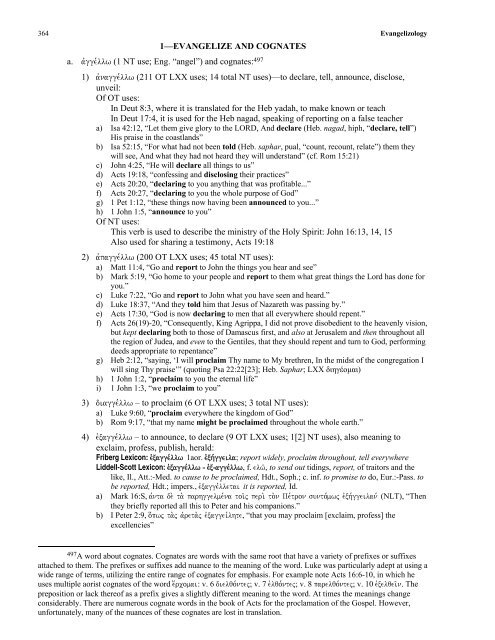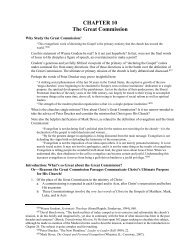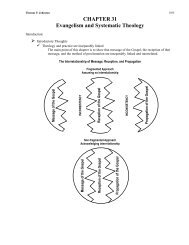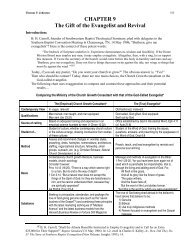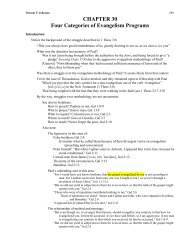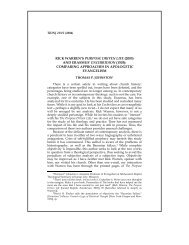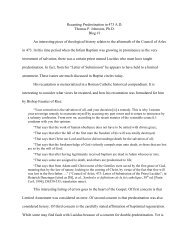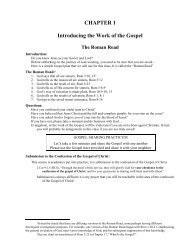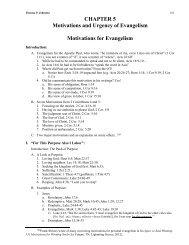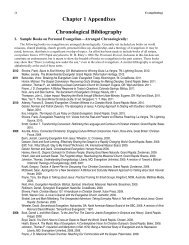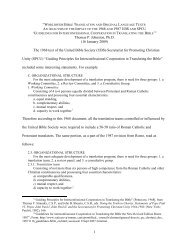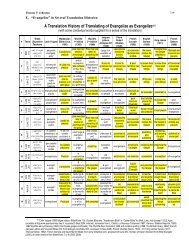CHAPTER 7 Defining Evangelizing - Evangelism Unlimited
CHAPTER 7 Defining Evangelizing - Evangelism Unlimited
CHAPTER 7 Defining Evangelizing - Evangelism Unlimited
You also want an ePaper? Increase the reach of your titles
YUMPU automatically turns print PDFs into web optimized ePapers that Google loves.
364 Evangelizology<br />
1—EVANGELIZE AND COGNATES<br />
a. avgge,llw (1 NT use; Eng. “angel”) and cognates: 497<br />
1) avnagge,llw (211 OT LXX uses; 14 total NT uses)—to declare, tell, announce, disclose,<br />
unveil:<br />
Of OT uses:<br />
In Deut 8:3, where it is translated for the Heb yadah, to make known or teach<br />
In Deut 17:4, it is used for the Heb nagad, speaking of reporting on a false teacher<br />
a) Isa 42:12, “Let them give glory to the LORD, And declare (Heb. nagad, hiph, “declare, tell”)<br />
His praise in the coastlands”<br />
b) Isa 52:15, “For what had not been told (Heb. saphar, pual, “count, recount, relate”) them they<br />
will see, And what they had not heard they will understand” (cf. Rom 15:21)<br />
c) John 4:25, “He will declare all things to us”<br />
d) Acts 19:18, “confessing and disclosing their practices”<br />
e) Acts 20:20, “declaring to you anything that was profitable...”<br />
f) Acts 20:27, “declaring to you the whole purpose of God”<br />
g) 1 Pet 1:12, “these things now having been announced to you...”<br />
h) 1 John 1:5, “announce to you”<br />
Of NT uses:<br />
This verb is used to describe the ministry of the Holy Spirit: John 16:13, 14, 15<br />
Also used for sharing a testimony, Acts 19:18<br />
2) avpagge,llw (200 OT LXX uses; 45 total NT uses):<br />
a) Matt 11:4, “Go and report to John the things you hear and see”<br />
b) Mark 5:19, “Go home to your people and report to them what great things the Lord has done for<br />
you.”<br />
c) Luke 7:22, “Go and report to John what you have seen and heard.”<br />
d) Luke 18:37, “And they told him that Jesus of Nazareth was passing by.”<br />
e) Acts 17:30, “God is now declaring to men that all everywhere should repent.”<br />
f) Acts 26(19)-20, “Consequently, King Agrippa, I did not prove disobedient to the heavenly vision,<br />
but kept declaring both to those of Damascus first, and also at Jerusalem and then throughout all<br />
the region of Judea, and even to the Gentiles, that they should repent and turn to God, performing<br />
deeds appropriate to repentance”<br />
g) Heb 2:12, “saying, ‘I will proclaim Thy name to My brethren, In the midst of the congregation I<br />
will sing Thy praise’” (quoting Psa 22:22[23]; Heb. Saphar; LXX διηγέομαι)<br />
h) 1 John 1:2, “proclaim to you the eternal life”<br />
i) 1 John 1:3, “we proclaim to you”<br />
3) diagge,llw – to proclaim (6 OT LXX uses; 3 total NT uses):<br />
a) Luke 9:60, “proclaim everywhere the kingdom of God”<br />
b) Rom 9:17, “that my name might be proclaimed throughout the whole earth.”<br />
4) evxagge,llw – to announce, to declare (9 OT LXX uses; 1[2] NT uses), also meaning to<br />
exclaim, profess, publish, herald:<br />
Friberg Lexicon: evxagge,llw 1aor. evxh,ggeila; report widely, proclaim throughout, tell everywhere<br />
Liddell-Scott Lexicon: evxagge,llw - evx&agge,llw, f. elw/, to send out tidings, report, of traitors and the<br />
like, Il., Att.:-Med. to cause to be proclaimed, Hdt., Soph.; c. inf. to promise to do, Eur.:-Pass. to<br />
be reported, Hdt.; impers., evxagge,lletai it is reported, Id.<br />
a) Mark 16:S, a,nta de. ta. parhggelme,na toi/j peri. to.n Pe,tron sunto,mwj evxh,ggeilan, (NLT), “Then<br />
they briefly reported all this to Peter and his companions.”<br />
b) I Peter 2:9, o[pwj ta.j avreta.j evxaggei,lhte, “that you may proclaim [exclaim, profess] the<br />
excellencies”<br />
497 A word about cognates. Cognates are words with the same root that have a variety of prefixes or suffixes<br />
attached to them. The prefixes or suffixes add nuance to the meaning of the word. Luke was particularly adept at using a<br />
wide range of terms, utilizing the entire range of cognates for emphasis. For example note Acts 16:6-10, in which he<br />
uses multiple aorist cognates of the word e[rcomai: v. 6 dielqo,ntej; v. 7 evlqo,ntej; v. 8 parelqo,ntej; v. 10 evxelqei/n. The<br />
preposition or lack thereof as a prefix gives a slightly different meaning to the word. At times the meanings change<br />
considerably. There are numerous cognate words in the book of Acts for the proclamation of the Gospel. However,<br />
unfortunately, many of the nuances of these cognates are lost in translation.


